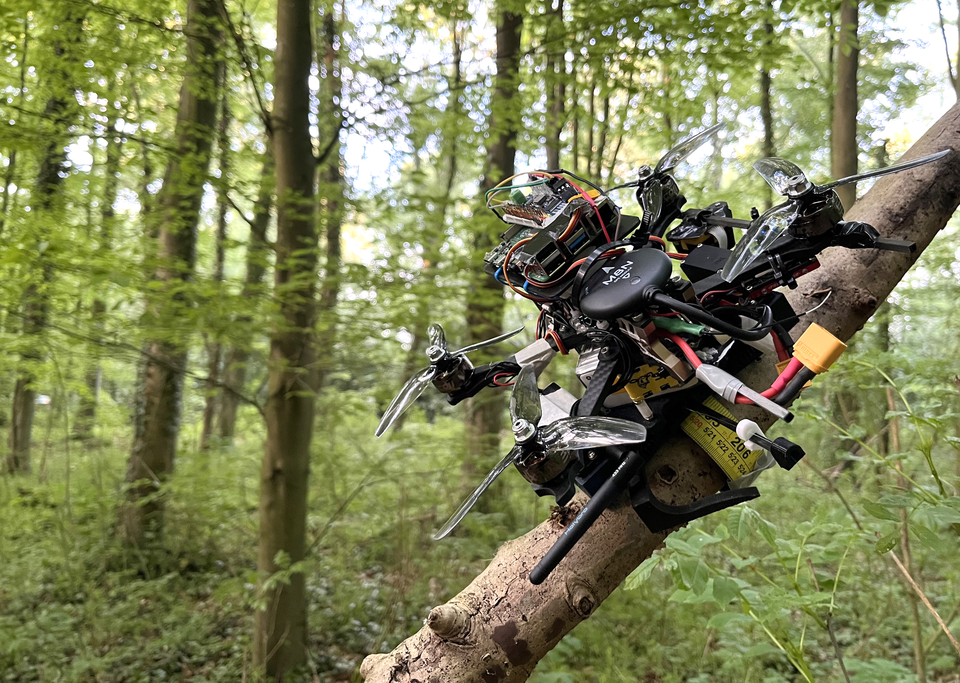TU Delft jointly wins XPRIZE Rainforest drone competition in Brazil
Imagine using rapid and autonomous robot technology for research into the green and humid lungs of our planet; our global rainforests. Drones that autonomously deploy eDNA samplers and canopy rafts uncover the rich biodiversity of these complex ecosystems while revealing the effects of human activity on nature and climate change.
On November 15, 2024, after five years of intensive research and competition, the ETHBiodivX team, which included TU Delft Aerospace researchers Salua Hamaza and Georg Strunck, achieved an outstanding milestone: winning the XPRIZE Rainforest Bonus Prize for outstanding effort in co-developing inclusive technology for nature conservation.
The goal: create automated technology and methods to gain near real-time insights about biodiversity – providing necessary data that can inform conservation action and policy, support sustainable bioeconomies, and empower Indigenous Peoples and local communities who are the primary protectors and knowledge holders of the planet’s tropical rainforests.
The ETHBiodivX team, made of experts in Robotics, eDNA, and Data Insights, is tackling the massive challenge of automating and streamlining the way we monitor ecosystems. Leading the Robotics division, a collaboration between TU Delft’s Prof. Salua Hamaza, ETH Zurich’s Prof. Stefano Mintchev and Aarhus University’s Profs. Claus Melvad and Toke Thomas Høye, is developing cutting-edge robotic solutions to gather ecology and biology data autonomously. “We faced the immense challenge of deploying robots in the wild -- and not just any outdoor environment but one of the most demanding and uncharted: the wet rainforests. This required extraordinary efforts to ensure robustness and reliability, pushing the boundaries of what the hardware could achieve for autonomous data collection of images, sounds, and eDNA, in the Amazon” says prof. Hamaza. “Ultimately, this technology will be available to Indigenous communities as a tool to better understand the forest's ongoing changes in biodiversity, which provide essential resources as food and shelter to the locals.”
After impressing in the 2023 Singapore semifinals, the team advanced to the XPRIZE RAINFOREST finals on July 12, 2024, in the Amazon rainforest, Brazil, competing for a $5 million prize. This year, TU Delft shifted from single-drone monitoring to deploying a network of sensor-equipped rafts. The goal was to create resilient canopy rafts that drones could deploy in dense, wet tropical canopies. Besides the complexity of drone operations, the rafts needed to meet specific design constraints: robust to withstand tropical weather, lightweight for drone transport, and engineered to avoid sinking into treetops.
The team deployed three canopy rafts for data collection and a fourth as a communication relay. However, the operation of suspending the rafts from drones proved challenging, as the hanging payload caused instability. Drone pilot Georg Strunck trained extensively in the Netherlands, Switzerland, and Brazil to perfect the technique prior to the finals.
On competition day, drones launched at noon for a 24-hour mission. A scouting drone flew ahead to find ideal deployment spots, but a sudden thunderstorm disrupted communication and shifted target locations. Despite setbacks, all rafts were successfully deployed by sunset. The next day, all rafts were collected, revealing a wealth of insects and organisms. TU Delft robotics student Georg Strunck: “It was incredible to see our team collect so many specimens using drone-deployed rafts, capturing numerous species—not only with sticky traps but also with the netting.”
Then, the real work began: 48 hours of intense data processing with help from citizen scientists and local indigenous communities. Four months later, the team was announced as the Bonus Prize winner at the G20 event in Rio de Janeiro. Prof. Hamaza: “We’re thrilled the team’s hard work paid off. It started off as a far hope -- competing against 300 teams -- then advancing to the finals with just five other teams and ultimately securing a prize for our outstanding efforts. These results achieved in the XPRIZE represent a significant milestone for conservation technology in the Amazon, and beyond”.
Images and video credit: Luca Desiderato
Sponsors: we would like to thank TU Delft Robotics Institute for financial support.








![[Translate to English:] [Translate to English:]](https://filelist.tudelft.nl/_processed_/6/f/csm_BIOMORPHIC_Lab_desktop_51270f18a8.jpg)